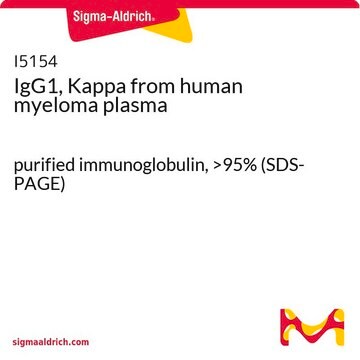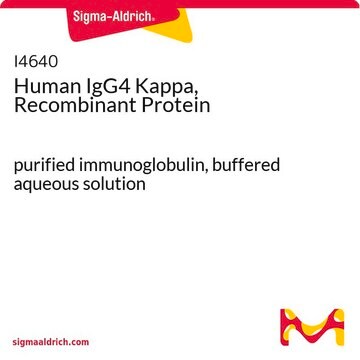I5029
IgG1, Lambda from human myeloma plasma
purified immunoglobulin, >95% (SDS-PAGE)
Synonym(s):
Human IgG1-λ
Sign Into View Organizational & Contract Pricing
All Photos(1)
About This Item
Recommended Products
biological source
human
Quality Level
conjugate
unconjugated
antibody form
purified immunoglobulin
Assay
>95% (SDS-PAGE)
shipped in
dry ice
storage temp.
−20°C
Looking for similar products? Visit Product Comparison Guide
General description
IgG antibody subtype is the most abundant serum immunoglobulins of the immune system. It is secreted by B cells and is found in blood and extracellular fluids and provides protection from infections caused by bacteria, fungi and viruses. Maternal IgG is transferred to fetus through the placenta that is vital for immune defence of the neonate against infections. IgG1 is the most abundant of the IgG subclass
Human myeloma IgG1, λ is purified from human plasma by fractionation, ion-exchange, and affinity chromatography procedures.
Human myeloma IgG1, λ is purified from human plasma by fractionation, ion-exchange, and affinity chromatography procedures.
IgG is the main antibody type found in plasma and extracellular fluid and is expressed on B cell membrane. IgG is further subdivided into four subclass- IgG1, IgG2, IgG3 and IgG4.Elevation in antigen specific IgG1 is associated with symptomatic infection and Th2-regulation. IgG1 λ from human myeloma can be used in quantitative ELISA.Human IgG1 λ react specifically with human IgG.
Application
IgG1 λ from human myeloma can be used as reference antigen, blocking agent, immunoglobulin calibrator or coating protein in various immunoassay like ELISA, dot blot immunobinding, immunodiffusion, immunoelectrophoresis, hemagglutination, cell-binding assays and western immunoblotting.
The purified IgG1, λ may be used as an immunoglobulin calibrator, reference antigen, blocking agent or coating protein in a variety of immunoassays including ELISA, dot-blot immunobinding, Western immunoblotting, immunodiffusion, immunoelectrophoresis, hemagglutination, and cell-binding assays. Human myeloma IgG1, λ was used as non-specific control in quantitative ELISA and solid-phase ELISA. A range of concentrations of IgG1, λ from 10 to 100 ng was used for quantitative ELISA. Human myeloma IgG1, λ was also used as control in size-exclusion chromatography to analyse purity of recombinant antibodies.
Physical form
Solution in 0.02 M Tris buffered saline, pH 8.0.
Analysis Note
Identity is determined by immunoelectrophoresis and indirect ELISA.
Disclaimer
Unless otherwise stated in our catalog or other company documentation accompanying the product(s), our products are intended for research use only and are not to be used for any other purpose, which includes but is not limited to, unauthorized commercial uses, in vitro diagnostic uses, ex vivo or in vivo therapeutic uses or any type of consumption or application to humans or animals.
Storage Class Code
10 - Combustible liquids
WGK
WGK 1
Flash Point(F)
Not applicable
Flash Point(C)
Not applicable
Certificates of Analysis (COA)
Search for Certificates of Analysis (COA) by entering the products Lot/Batch Number. Lot and Batch Numbers can be found on a product’s label following the words ‘Lot’ or ‘Batch’.
Already Own This Product?
Find documentation for the products that you have recently purchased in the Document Library.
Customers Also Viewed
M J Day
Veterinary parasitology, 147(1-2), 2-8 (2007-05-01)
Infection with Leishmania may have different outcomes in genetically distinct individuals and the course of infection is determined by the nature of the host innate and adaptive immune response. Thus in experimentally infected mice, and in naturally infected dogs or
Cristina Capodicasa et al.
Plant biotechnology journal, 9(7), 776-787 (2011-01-27)
There is an increasing interest in the development of therapeutic antibodies (Ab) to improve the control of fungal pathogens, but none of these reagents is available for clinical use. We previously described a murine monoclonal antibody (mAb 2G8) targeting β-glucan
W L Zhao et al.
Journal of the European Academy of Dermatology and Venereology : JEADV, 36(2), 271-278 (2021-10-28)
The detection of serum anti-desmoglein (Dsg) IgG autoantibodies has been reported to be useful for assessment of disease activity in pemphigus. However, previous studies have reported that anti-Dsg autoantibodies remain detectable in some patients without active pemphigus lesions. To investigate
Targeting CD70 in combination with chemotherapy to enhance the anti-tumor immune effects in non-small cell lung cancer.
Flieswasser, et al.
Oncoimmunology, 12, 2192100-2192100 (2023)
Ken Ishii et al.
The Journal of investigative dermatology, 140(10), 1919-1926 (2020-03-07)
Anti-desmoglein (Dsg) 1 and Dsg3 IgG autoantibodies in pemphigus foliaceus and pemphigus vulgaris cause blisters through loss of desmosomal adhesion. It is controversial whether blister formation is due to direct inhibition of Dsg, intracellular signaling events causing desmosome destabilization, or
Our team of scientists has experience in all areas of research including Life Science, Material Science, Chemical Synthesis, Chromatography, Analytical and many others.
Contact Technical Service









